One of the perks of awards season is the chance to check in on filmmakers whose work you've followed for years and, in some cases, decades. 2019 brings arthouse and multiplex audiences a chance to ease into those telltale signposts that marks a director's personality and distinctive approach to the medium.
The following high-profile releases show esteemed directors from New Zealand, Norway, Spain and Taiwan evolving in all kinds of intriguing ways and returning to themes and scenarios that put them on the map. They explore subjects as diverse as life under fascism, paternal responsibility and the toll that artistic expression takes. They feel, to varying degrees, vibrant and poignant, even the one released by Disney's corporate overlords.
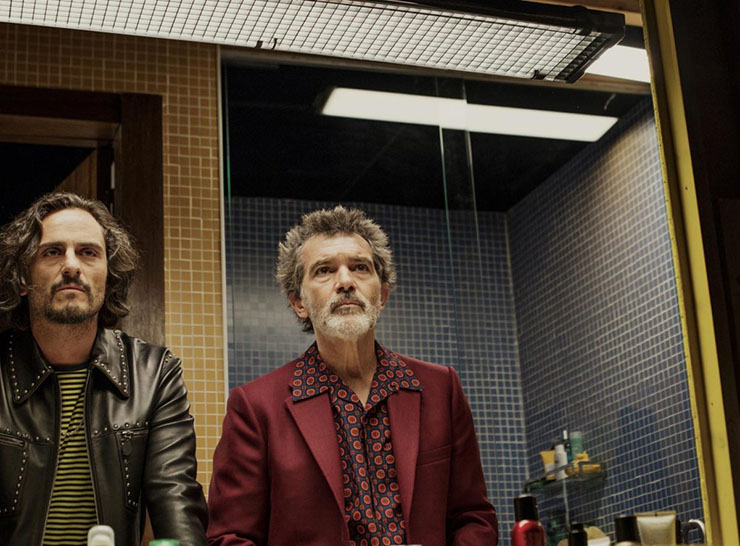
Asier Etxeandia, Antonio Banderas in "Pain and Glory."
"Pain and Glory": The question is inevitable for anyone who decides to hang up their hat and call it a day on a long career: What are you going to do now? It's no different if said career was an internationally renowned movie director. When asked what he's going to do with so much free time marked by a conspicuous absence of moviemaking, Salvador Mallo, the grizzled auteur at the center of Pedro Almodóvar's nakedly autobiographical gem, simply replies, "Live, I guess."
Ah, but living entails grappling with your demons, carefully examining the scars we collect along the way. For Salvador, played by a pitch-perfect Antonio Banderas, this is mostly meant literally. The new retiree is dealing with chronic pain; more recently, he starts choking with alarming frequency. In a sequence best described as a science convention slideshow created by Saul Bass, Almodóvar lists the many ailments his thinly veiled surrogate suffers from. It's an invigorating stylistic flourish from a director unafraid to lead with his shiny, often colorful surfaces.
But what sets "Pain and Glory" apart from much of the "Talk to Her" and "Women on the Verge of a Nervous Breakdown" director's previous efforts, especially those made in the past 20 years, is a pervasive reining in of those impulses. This is a character study where the filmmaker's penchant for nonlinear and Chinese box structures takes a back seat to his protagonist's self-appraisal. (Soul searching hardly applies here, since Salvador is a self-avowed atheist.)
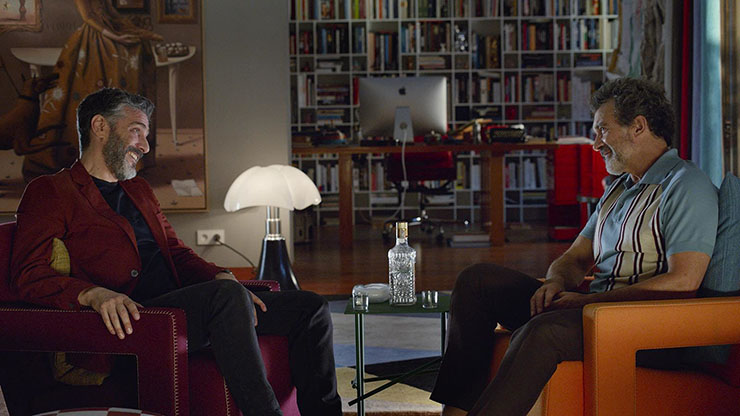
Leonardo Sbaraglia, Antonio Banderas in "Pain and Glory"
Yes, the film glides backwards and forward in time, as Salvador reflects on his childhood and the tireless efforts from his mother Jacinta (Penélope Cruz, always at her best when directed by Pedro) to ensure her precocious boy (Asier Flores, a natural) moves up in the world. But Almodóvar resists calling attention to his structural gallivanting this time around, the better to follow Salvador's journey as he reconnects with his estranged muse, stage and screen actor Alberto Crespo (Asier Etxeandia). He also crosses paths with old flame Federico Delgado (Argentinean star Leonardo Sbaraglia) in a scene that is as exquisitely bittersweet as anything Almodóvar has staged. Salvador also begins dabbling in heroin use. A more conventional production would have focused on the character's late-in-life substance intake, but here it's depicted as a temporary reprieve, merely one more component in a rich tapestry of memory and regret.
The nostalgia here is predominantly of the self-critical kind, and that makes a world of difference. Almodóvar uses the template of the Felliniesque confessional, not as an end, but as a jumping off point to chart a path forward. In so doing, he has crafted one of his very best films. Believe the hype.
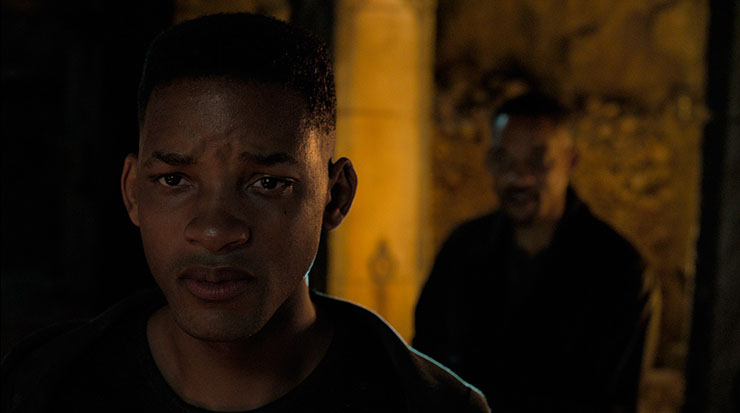
Will Smith in "Gemini Man"
"Gemini Man": Whereas Almodóvar is looking to the past and present for storytelling material, Lee continues playing in the futuristic high frame rate sandbox, with decidedly mixed results. The "Life of Pi" helmer's latest effort is a cloning tale that, like "Pain and Glory," involves a recently retired longtime pro. It lays bare the virtues and limitations of the newfangled technology I like to call Squeegee Vision. The Paramount Pictures release is being marketed as an action extravaganza from producer Jerry Bruckheimer, but even though this tale of ethics and government corruption has its fair share of pulse-pounding moments, it actually feels closer in spirit to the character-driven pieces one comes to expect from Lee.
The film stars Will Smith as government hit man Henry Brogan, a crack shot who can take out a moving target from a far distance. (How fast? Try a bullet train.) But that ease with which he'd move from one assignment to the next has begun to dwindle, prompting him to put his assassin days in the rearview mirror. If only it were that easy. A fishing expedition in Georgia takes a life-threatening turn after he finds himself on the other side of the cross-hairs, first by a special ops team, then by a young man with familiar moves. Who is his spitting image.
The striking resemblance, naturally, is no coincidence. The encroaching threat sends Brogan, a boat rental manager with her own secrets (Mary Elizabeth Winstead) and an old associate (Benedict Wong, assuming comic relief duties) on a globetrotting quest to uncover a government conspiracy orchestrated by Clay Verris (Clive Owen), the head of a secret black-ops operation, who's been playing God with Brogan's DNA.
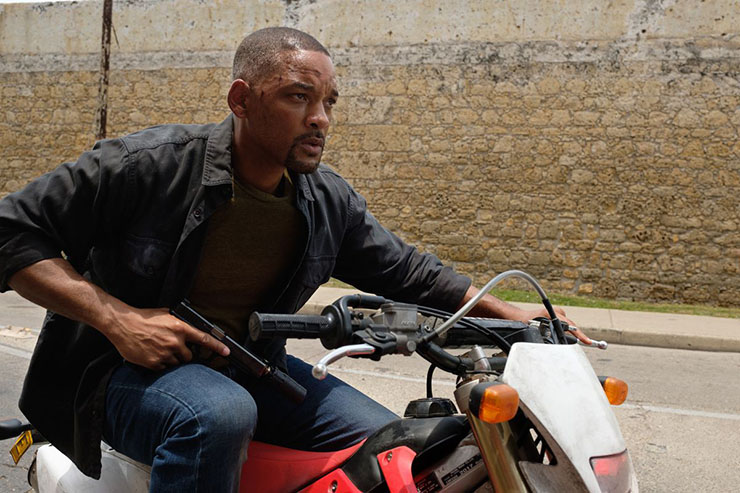
Will Smith in "Gemini Man"
What looks on the surface like a peppy spy yarn turns into a more laid-back affair under Lee's assured direction, as Brogan confronts a Mini Me determined to carry out his mission but not-so-secretly harboring doubts. That gives Lee the chance to frame this conflict as a more internal identity struggle, as well as tap into the paternal anxiety that's driven so much of his past work. It would have worked like gangbusters, if the script, credited to "Game of Thrones" co-showrunner David Benioff, Billy Ray and Darren Lemke, didn't saddle them with lackluster dialogue and a handful of feeble jokes. The villains, in particular, are pretty one-dimensional. It doesn't help that the special effects allowing Smith to play his clone are uneven, to say the least.
But there's a disarming generosity of spirit coursing through "Gemini Man" that's reminiscent of late-period Clint Eastwood. The brawny swagger one comes to associate with a genre piece like it is nowhere in sight. It doesn't have a mean bone in its body. Also, while I'm hardly the biggest fan of high frame rate, experiencing this adventure in its preferred 3-D HFR exhibition format reveals that, while Lee still hasn't worked out all the kinks, he has taken advantage of its hyperclarity more than previous efforts. (I'm looking in your direction, Peter Jackson.) The motorcycle chase sequence near the halfway point, for instance, delivers the goods in satisfying over-the-top fashion that recalls the 1990s work of Hong Kong auteur John Woo, while at the same time adding a bracing immediacy that brings to mind first-person video games.
Yes, it takes a while to acclimate to the video-y sheen, but those willing to take the plunge will likely not be disappointed by this pleasant, agreeably silly flick that did not merit its critical drubbing and lousy box office performance. (It should also play well in more old-fashioned digital projection.) It's lesser Lee, to be sure, but that's still better than the norm.
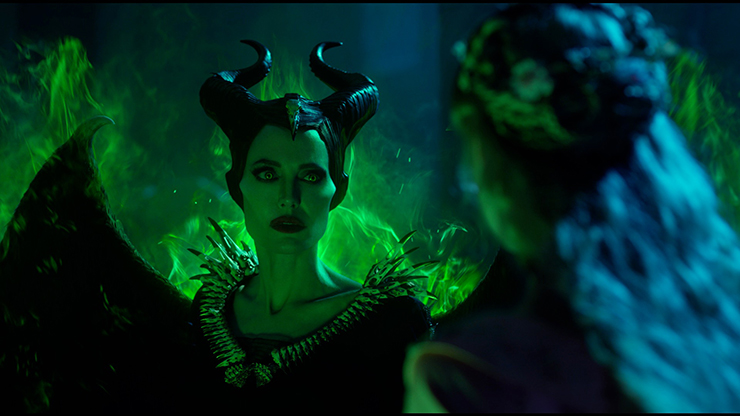
Angelina Jolie in "Maleficent: Mistress of Evil"
"Maleficent: Mistress of Evil": Another underrated title at your local multiplex is this surprisingly competent sequel that no one asked for but still manages to improve upon its middling predecessor. Faint praise, I know. The first "Maleficent" (2014) reconceived the iconic villain from Disney's "Sleeping Beauty," played by Angelina Jolie, as a misunderstood antihero who lashed out after she had her wings clipped, literally. For grown-ups, the parallels to sexual assault were unmistakable, but that bold bit of revisionism was not enough to redeem its tired, waterlogged narrative.
So kudos to Norwegian director Joachim Rønning for making this latest incarnation of the character work on her own terms, this time by zeroing in on her as an overprotective parental figure. It's been five years since Aurora (Elle Fanning) was awakened from her eternal slumber curse. She's no Disney princess, but Queen of the Moors (i.e. home to fairies and other magical creatures). The born leader accepts a marriage proposal from sweetheart Prince Phillip (Harris Dickinson, taking over from Brenton Thwaites), but Maleficent isn't sold on the idea. She smells a rat, but the stench is not coming from Phillip's peace-loving father, King John (Robert Lindsay), but from his mom, Queen Ingrith (Michelle Pfeiffer). A tense meet-the-in-laws dinner does not go well, and the battle lines are drawn. Ingrith takes advantage of the situation and spreads the falsehood that Maleficent wants to destroy humans and has cursed John. The movie, to its credit, reveals the corrupt ruler's wicked scheme instead of playing coy and falling into the hidden villain trope.
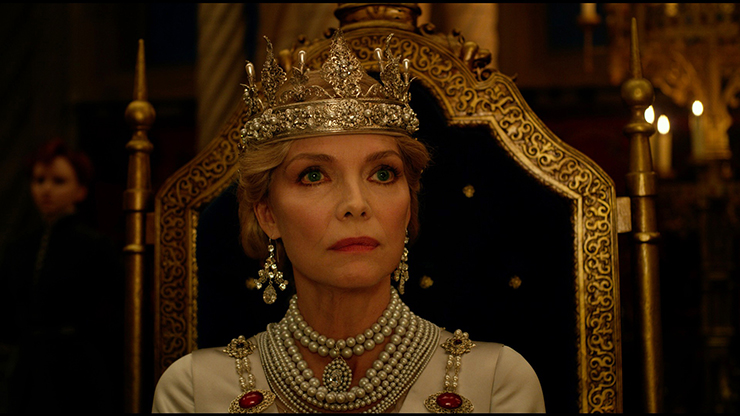
Michelle Pfeiffer in "Maleficent Mistress of Evil."
Ever since he was nominated for an Oscar for "Kon-Tiki," the seafaring adventure he co-directed with Espen Sandberg, Rønning has become a hired hand for Disney, but this intriguing foray into fantasy hardly feels generic. Working from a screenplay by longtime Disney scribe Linda Woolverton, the new "Maleficent's" tale of the downtrodden forest folk persecuted by humans is potent enough to double as a metaphor for the fight for LGBTQ rights, with Pfeiffer's evil queen its very own Anita Bryant. In case we missed the message, the movie introduces a rainbow-colored winged creature. (This is, by far, the gayest studio release this critic has seen this year, in so many ways.)
It goes down easy, thanks to a colorful palette and Woolverton's refusal to soft-pedal the nefarious lengths Queen Ingrith will go to carry out her anti-fairy agenda. A scene set inside a church, of all places, threatens to become a tyke-friendly version of "Game of Thrones'" Red Wedding. Part of me wishes Rønning and Woolverton had gone even further. Alas, they pump the brakes before things get too dark. But I'm not complaining. After a very uneven 2019 slate, it looks like moviegoers, at least in the U.S., have turned their backs on the wrong franchise. "Mistress of Evil" may not be very evil. On the contrary, it's quite amiable and empowering. It's well worth seeking out all the same.
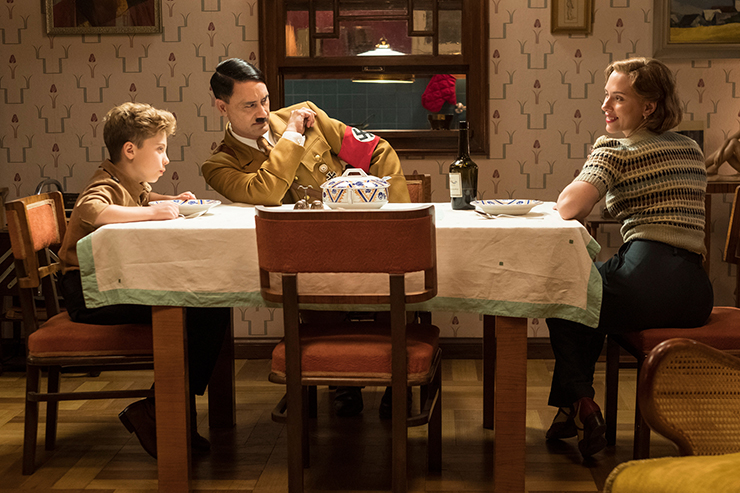
Roman Griffin Davis, Taika Waititi, Scarlett Johansson in "Jojo Rabbit"
"Jojo Rabbit": It's a risky proposition, but audiences appear to go for it time and time again, when a filmmaker takes one of the darkest chapters in world history and turns it into fodder for comedy or satire. Mel Brooks won a screenplay Oscar for turning Adolf Hitler into the subject of a godawful (on purpose) Broadway musical in "The Producers." Thirty years later, Roberto Benigni won acting and foreign language feature statuettes for turning a concentration camp into a setting for a Chaplinesque dramedy in "Life Is Beautiful." Now, writer/director/co-star Taika Waititi, the naughty New Zealander behind "What We Do in the Shadows" and "Thor: Ragnarok," makes Nazi Germany the butt of the joke in this buoyant black comedy. It's safe to say your mileage will vary. Me? I'm rather fond of it.
Based on Christine Leunens' novel "Caging Skies," the movie's title is a cruel moniker participants at a Hitler youth training camp call 10-year-old Johannes Betzler (newcomer Roman Griffin Davis) after he doesn't do as he's ordered during a test designed to prove his mettle. It's a good thing Jojo has his imaginary friend to lean on. That would be Hitler, or at least his version of the Fuhrer (Waititi). The figment of the boy's imagination acts as a representation of his own prejudices as well as a one-man support system.
There's something gratifyingly broad about the early scenes in "Jojo Rabbit," which often play like a live-action cartoon. Comparisons have been made to Wes Anderson in general and "Moonrise Kingdom" in particular, but the similarities are mostly surface-deep. "Jojo Rabbit" actually kicks into gear after our pint-sized wannabe fascist comes back home following an accident at camp, and discovers his mom Rosie (Scarlett Johansson, exuding star quality) has been hiding a Jewish teen, Elsa ("Leave No Trace's" Thomasin McKenzie).
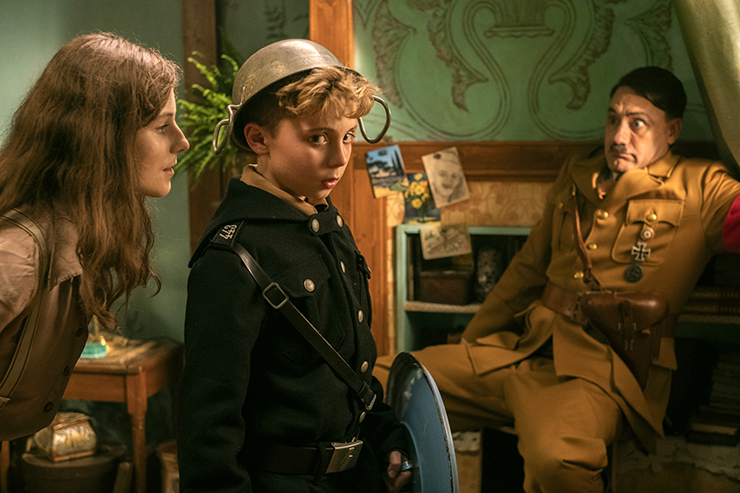
Thomasin McKenzie, Roman Griffin Davis, Taika Waititi in "Jojo Rabbit."
How the children's mutual distrust morphs into something altogether less hostile takes up the bulk of "Jojo's" episodic narrative. Some have balked at its depiction of fascism from the skewed perspective of a boy who sympathizes with Hitler but is forced to reexamine his fanaticism. Look, it's not like the detractors are wrong. The world is ready for a portrait of childhood in war-torn Europe that doesn't pull its punches. Louis Malle accomplished that feat, albeit in France, in the indelible "Au revoir les enfants" back in 1987. If anything holds back Waititi's film, it's that it shields viewers too much from the Third Reich's atrocities. It allows for a more palatable depiction of genocide, which befits a film that never pretends to be a gritty docudrama and wears its fanciful trappings on its sleeve, even as it dilutes its impact for mass consumption. It's as if Waititi had mixed together John Boorman's semi-autobiographical World War II film "Hope and Glory" with "Forrest Gump." How you perceive the latter film, which smooths over the wrinkles of parts of 20th century U.S. history, might turn out to be a reliable gauge of how you react to Waititi's tender brand of absurdism.
But even as "Jojo" could have used more of a reality check, there's no denying it gives us characters worth giving a damn about. Davis probably faces the toughest challenge on screen, and he skillfully navigates the film's blend of melancholy and whimsy. He's given ample backup by a solid supporting cast that includes Sam Rockwell, Rebel Wilson and Stephen Merchant. The movie also features a scene-stealer in Archie Yates, who hits just the right note of self-effacing resignation as Jojo's best friend Yorki. (This one is real.)
"Jojo Rabbit" walked away with the coveted Audience Award at this year's Toronto International Film Festival. My hunch is that this will translate into box office appeal more than awards recognition, considering the stacked slate competing for year-end kudos. But when it comes to this witty, goofy and touching period charmer, this is one time I'm glad I learned to stop worrying and dig the (somewhat problematic) crowd-pleaser.
"Pain and Glory" runs thru Nov. 7 at the Coral Gables Art Cinema. It is also showing at Regal South Beach, Tower Theater in Little Havana and the Classic Gateway Theatre in Fort Lauderdale. You need to hurry up if you want to catch Ang Lee's "Gemini Man" in high frame rate 3-D, at Cinemark Paradise in Davie. It's still showing in regular auditoriums across South Florida. "Maleficent: Mistress of Evil" is also ongoing at area theaters, including the Silverspot Cinema in downtown Miami and the IPIC in North Miami Beach. "Jojo Rabbit" opens in South Florida this weekend, including the Landmark at Merrick Park and the Gateway Theatre. Happy viewing.




